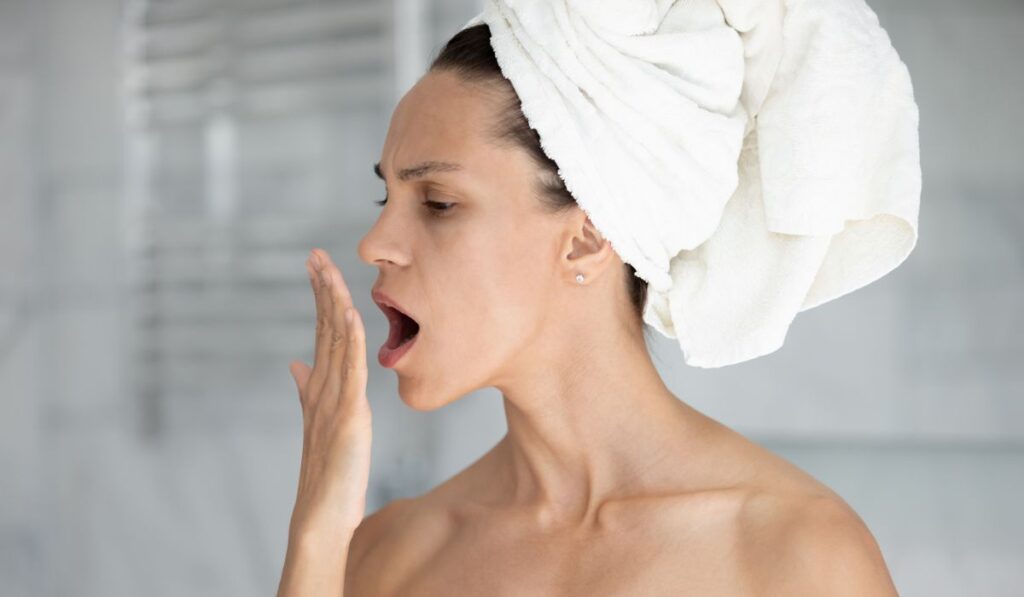We’ve all been in the situation where you wake up in the morning with some pretty bad breath and rush to brush your teeth. But what if you still have bad breath after brushing? Unfortunately, persistent bad breath is quite common, and it may not go away even with a good brushing. So, what causes this persistent bad breath, and how do you get rid of it?
Poor oral hygiene is the main cause of bad breath. However, certain foods may also leave a foul smell in your mouth for many hours. Other causes of bad breath include illness, acid reflux, and cavities or gum disease. The best way to get rid of bad breath is to brush and floss properly.
Although proper oral care is generally the best approach, if your bad breath is caused by specific health or dental problems, you’ll have to visit a professional for further advice. Let’s take a closer look at the main cases of persistent bad breath and explore some solutions to help you get rid of it for good.
Why Do I Have Bad Breath After Brushing My Teeth?

If you’ve just brushed your teeth and the bad breath won’t go away, it could be due to cavities, gum disease, acid reflux, illness, or dry mouth. Bad breath caused by garlic or other strong foods may not go away even after brushing.
However, more than 80% of the time, bad breath is a sign of poor oral hygiene. You may not be brushing as often as recommended, or you may not be following the correct brushing technique. Lifestyle factors like smoking or consumption of tobacco products may also give you lingering bad breath.
In severe cases, medical conditions such as diabetes or kidney disease could also be the cause of your bad breath. If you have an intestinal illness or flu, you’re more likely to get bad breath that remains even after brushing.
Foods That Cause Bad Breath
Certain foods have such strong odors that will cause bad breath even after you brush. While everyone knows that eating raw garlic and ginger can result in bad breath, there are many other foods with strong odors that even toothpaste won’t remove.
Did you know that many of the foods that we eat regularly, such as milk or yogurt, can also cause bad breath? These foods are likely to ferment when exposed to saliva, resulting in increased levels of bacteria that may cause bad breath. However, bad breath caused by dairy products can usually be cleared by brushing properly.
Other foods like onions, garlic, chilies, and even tomatoes have strong natural odors that can cause bad breath. In these cases, the bad breath will often linger even after brushing since brushing will only get rid of bacteria.
If you have bad breath after eating particularly smelly foods, you can usually get rid of it by drinking pineapple juice (on Amazon), eating an apple, or chewing raw mint leaves. These foods will absorb the strong odor of garlic and other strong-smelling foods, giving you instant fresh breath.
Acid Reflux
Acid reflux, or gastroesophageal reflux disease, is a medical condition that may cause chronic bad breath. When you get acid reflux, the undigested food and/or acid in your stomach may push back up your esophagus and increase the bacteria levels in your mouth, resulting in bad breath.
When you experience acid reflux, you’ll likely feel a burning sensation in your throat. While this may feel similar to vomiting, it’s actually caused by an acid imbalance in your digestive system. If you experience this, you’ll have to see a doctor and avoid eating acidic foods.
Cavities or Gum Disease
Cavities and gum disease are the main causes of chronic bad breath, apart from poor oral hygiene. If you have bad breath even after brushing, it could be caused by bacteria hiding in the cavities where your toothbrush can’t reach. If you have a deep cavity that exposes the tooth nerves, you’ll likely retain the bad breath.
The same goes for people who have gum diseases. For example, gingivitis causes gum tissue to become inflamed and and “swell,” leaving pockets for foul-smelling bacteria that may cause bad breath.
Periodontal disease, meanwhile, causes bone loss around the teeth, resulting in deeper pocketing around the tooth and gums. These pockets can harbor food and bacteria, leading to bead breath (as well as further destruction to the bone and tooth loss).
In any of these cases, the bad breath isn’t the main thing you should be concerned about! If you notice a cavity or signs of gum disease, get an appointment with your dentist immediately.
Poor Oral Hygiene
Poor oral hygiene is the primary cause of bad breath. If you have bad breath even after brushing, you may not be brushing properly. Take some time to review your brushing technique.
Are you rushing when you brush your teeth? Do you skip important areas like your tongue? Experts recommend brushing your tongue as an essential part of your oral hygiene routine, and a failure to do so may result in bad breath. Consider using a tongue brush (on Amazon) regularly to help you keep your mouth fresh and clean.
Another crucial aspect of oral hygiene that’s often ignored is flossing. Statistics show that almost 50% of all Americans don’t floss daily. If you forget to use floss (on Amazon) on a daily basis, bacteria may build up in between your teeth and gums, causing lingering bad breath.
When to See a Professional

If you have bad breath that doesn’t go away even after you brush your teeth, there’s no need to panic. In most cases, the bad breath will go away when you get your oral hygiene routine right. Brush after every meal and floss at least once a day to get rid of bad-smelling bacteria.
If your oral hygiene routine is already pretty solid, check your diet and lifestyle habits. Avoid smoking or eating foods that cause bad breath. You may not realize it, but the garlic you ate the night before can cause you to have bad breath even after brushing in the morning.
If you always have bad breath despite taking care of your oral hygiene and diet, you should visit a dentist. Your dentist will look for the underlying cause of the issue and fill any cavities that may be harboring bacteria.
They may also recommend you visit a doctor if your bad breath is caused by acid reflux or other underlying medical conditions.


